If the skin on your face or some other visible area of your body seems dotted with unsightly brownish or blueish patches, you may suffer from a common but potentially embarrassing hyperpigmentation condition known as melasma. The more you understand about this condition, the more effectively you can seek the appropriate treatment to get it under control. Let's examine melasma's causes, symptoms, triggers, and available treatment options.
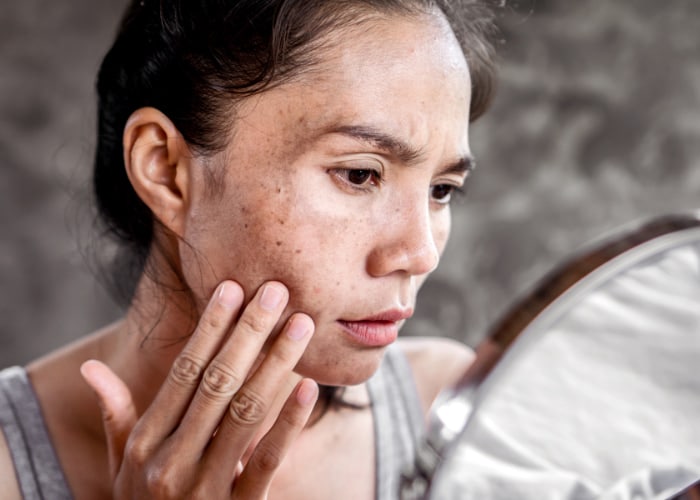
Melasma literally means "dark spot." It is classified as a hyperpigmentation disorder, not some kind of cancer or pre-cancer. Depending on whether you have epidermal, dermal, or mixed melasma, you may see brown, gray, or blue-tinged patches on your skin. commonly affected areas include the forehead, upper lip, chin, and nose. However, it can also spread across your back, neck, or arms if you regularly expose those areas to sunlight.

Hormonal changes or imbalances can cause or contribute to melasma. Changes in your estrogen or progesterone levels often bring it on, which is why you may hear it referred to as the "mask of pregnancy". Thyroid hormone levels can also play a role in its development.
UV exposure is a major trigger for melasma. Both natural sunlight and tanning lamps can make characteristic skin patches appear. Medications that boost your sun sensitivity could make you even more vulnerable, just as hormone treatments or birth control drugs can. Other potential causes involve cosmetics, skin irritants, and inherited factors. While the condition usually occurs in women, men can develop it as well.
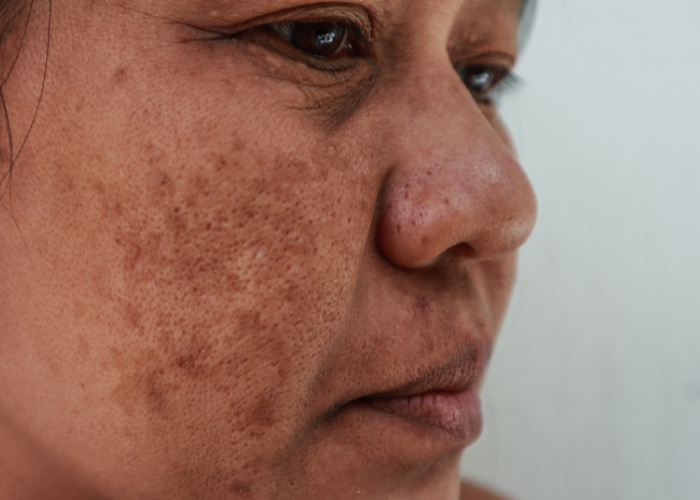
Melasma symptoms can range from small spots of discoloration to large discolored patches. These areas can appear brown, gray, blue, or any combination of these colors. Darker-skinned individuals tend to experience more severe discoloration due to their skin's extra melanin pigment.
Melasma spots tend to be larger than freckles or liver spots. They also lie flat instead of raised, unlike some moles or cancerous lesions. Even so, you should have your skin checked to confirm that you don't have a lookalike condition that might require medical treatment. Melasma doesn't cause itching, pain, or irritation.
Some cases of melasma come and go with pregnancy or hormonal shifts. However, others can linger for months at a time. If your symptoms persist, cosmetic treatments can help.
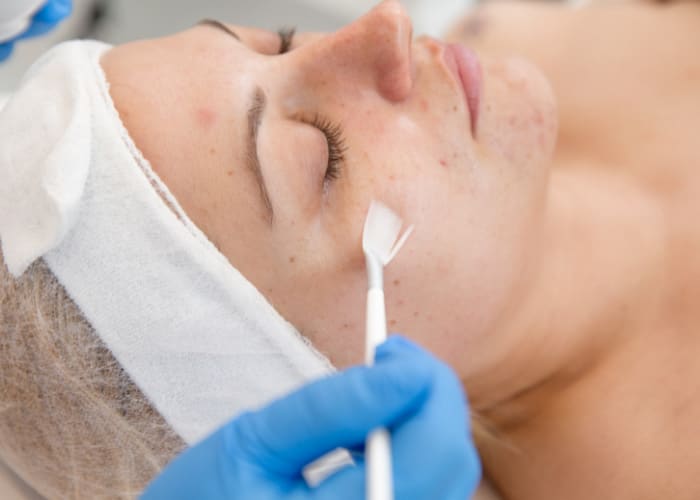
An FDA-approved skin peel treatment called GlamourPeel may lighten your melasma. Although skin peels in general can help reduce melasma discoloration, GlamourPeel's method is especially safe and comfortable. This topical treatment gently exfoliates the skin, lightening discolored patches while also stimulating collagen production.
It's a good idea to discontinue any skin treatments or shaving before undergoing a GlamourPeel. Following treatment, you may receive a post-peel protectant to apply at bedtime.
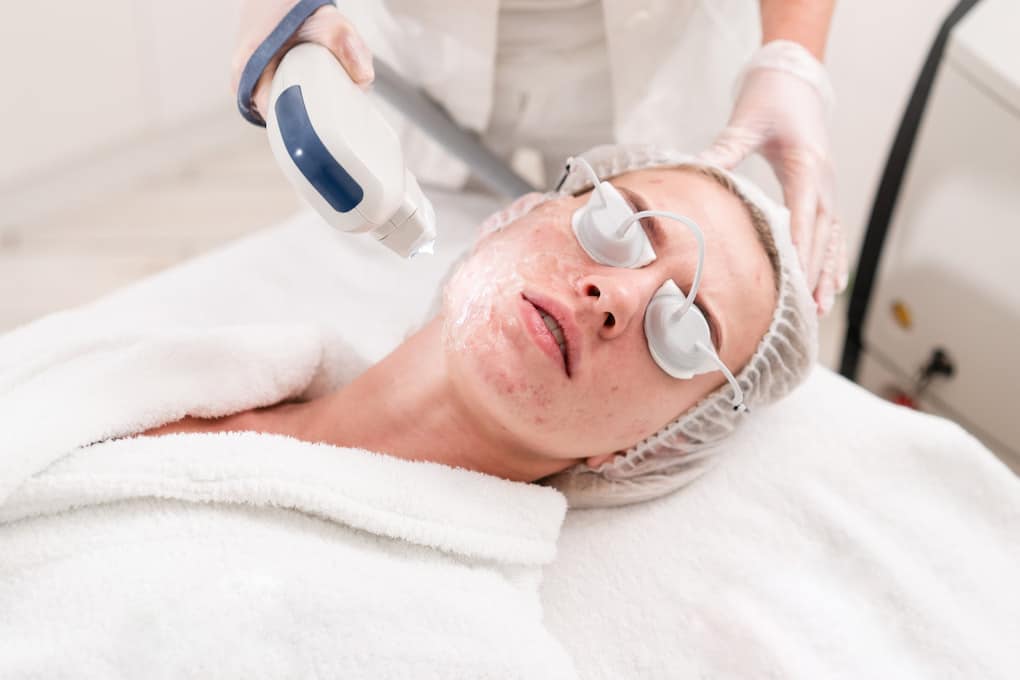
Laser therapy can also treat melasma successfully. The FDA-approved Picocare 450 Laser targets melanin in the skin, lightening this pigmentation on contact. (It does the same for tattoos.)
You must avoid UV exposure as much as possible in the month leading up to your laser treatment. Afterward, clean the treatment site gently with soap and water, but avoid rubbing it. If you experience any discomfort, you can take ibuprofen or other over-the-counter medications for relief. Avoid hot tubs, swimming pools, and contact sports until the area has fully recovered.
If you have a particularly challenging case of melasma or you just want to optimize your treatment outcome, you can opt for a combination of chemical peels and laser therapy, either both at the same time or with one form of treatment following the other. These two therapies can have a synergistic effect, boosting each other's effectiveness.
Shasta Meadows Wellness Center offers safe, state-of-the-art Redding melasma treatment to help you tame this chronic cosmetic issue and regain your quality of life. Ask your dermatologist whether our treatment methods suit your needs. Then contact us to schedule your first appointment and learn more about our aesthetic services!
Are you struggling with damaged self-esteem due to acne scars? If so, you aren’t alone. Acne has treatments that are often quite effective once your medical team finds the right underlying cause. Yet this serious condition can leave behind scarring. Those scars can lead to deep psychological damage, and they affect a large portion of the population. If you’re one of the many affected by acne scares in Redding, CA, here’s how you can take back your mental health.
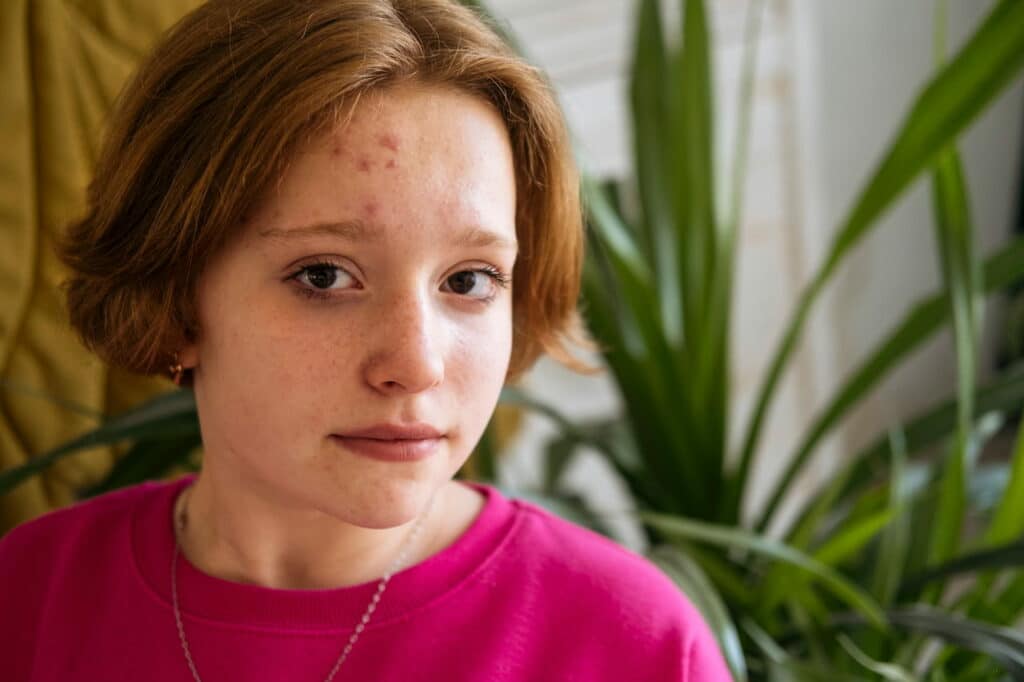
Active acne can cause psychological distress for sufferers. When the acne leaves behind scars, those psychological effects continue after the initial acne has cleared. According to the National Institutes of Health, acne typically occurs during adolescence, which is when people develop their self and social identities. Thus, the psychological impact of acne affects the brain during important developmental periods.
Once someone’s self-esteem is damaged, it affects their social interactions. Someone with a negative body image is not going to seek social interaction and deep relationships like someone with a positive body image might. This social isolation and lowered self-esteem can lead to anxiety and depression over the long term.
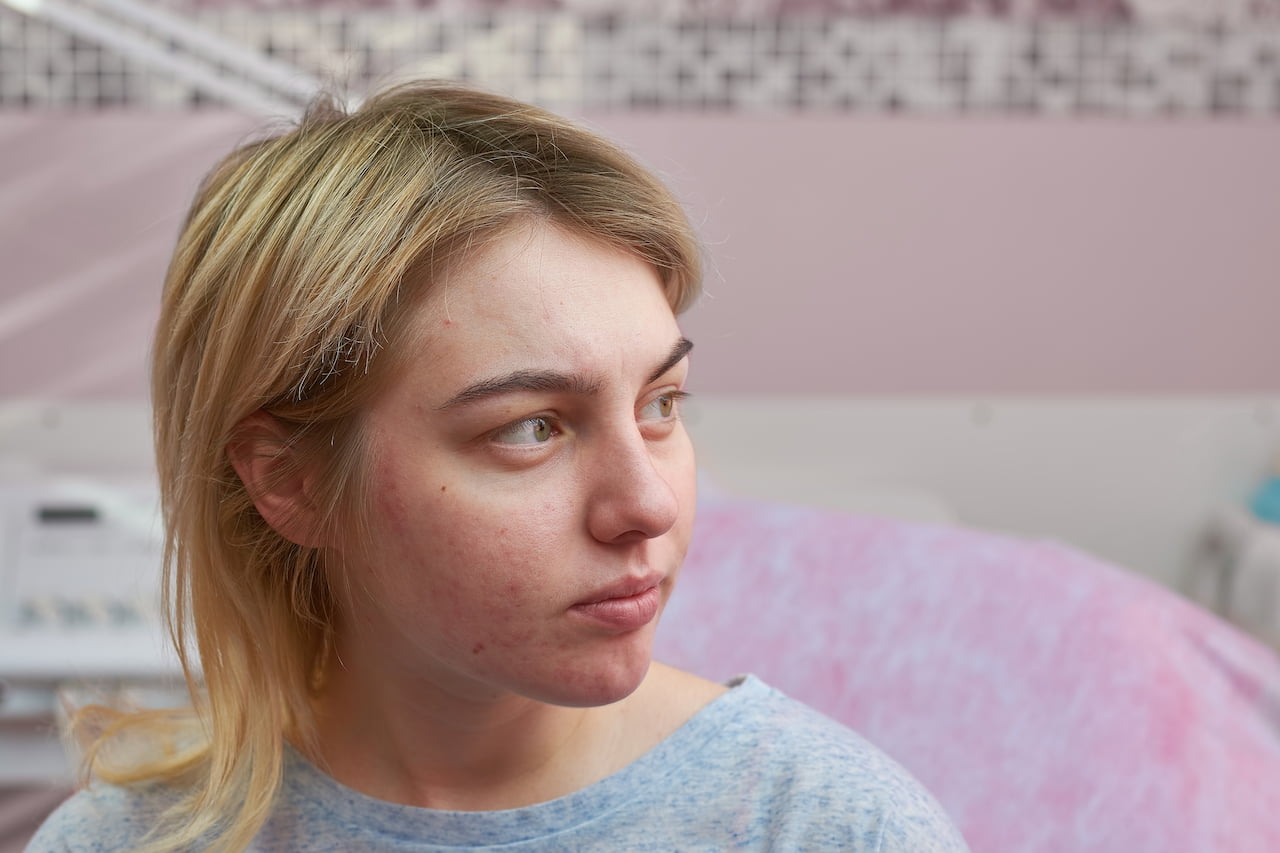
This psychological impact has many potential causes. The brain development stage is one reason for this physiological impact, but society’s high standards for beauty are another. Digital media shows perfectly groomed and airbrushed faces that give an unfair standard of beauty. This leads to an internalization of the negative self-perception those with acne scars deal with. Not only are they struggling with feeling less beautiful, but they see people all around them posting filtered and edited images that enforce that feeling.

The anxiety, depression, and low self-esteem of acne and acne scars shouldn't be ignored. The best first step is practicing positive self-talk that can lead to self-acceptance. Overcoming the emotional effect of acne scars may require seeking professional help and emotional support. Therapy and counseling can provide people with the tools they need to accept who they are and see their positive qualities.

If you suffer from low self-esteem due to acne scars, you should take practical measures to improve your self-confidence. Some strategies include:
Remember, your wealth and value don’t come from what you look like. It comes from who you are and how you use your skills and talents to make a difference.

Addressing the psychological impact of acne scars is important, but your self-care could include treating the scars themselves. Improving the appearance of your skin can give you an added boost to your self-esteem. For those suffering from acne scars in Redding, CA, Picocare 450 Laser Treatment could be a solution.
Picocare 450 effectively reduces the appearance of acne scars and the enlarged pores many acne sufferers have. It combines ultra-short picosecond laser and HEXA Laser Induced Optical Breakdown to lift and tighten the damaged areas. It can also remove the pigmentation that’s common after serious acne battles.
Treatment for acne scars in Redding with Picocare 450 can help you heal both physically and psychologically. Make sure you’re getting the right emotional support during treatment to address your inward thinking while addressing your outward appearance.

Protecting your mental health should take on a holistic approach. Not only should you address your body image concerns due to acne scars, but you should also learn to reduce stress and practice healthy self-care routines. Lowered stress levels can reduce symptoms of anxiety and depression and improve your overall self-esteem as well.
One way to improve your mental health and give yourself more resilience is through relaxation and mindfulness. Relaxation techniques like deep breathing or meditation can lower stress hormone levels and allow you to think more positively. Mindfulness involves learning to live in and take in the moment rather than focusing on the past or the future. Both can help you with your overall mental health.
Acne scars can damage self-esteem and increase your risk of depression and anxiety. Learning to love yourself through therapy and good emotional support is the first step in overcoming this. Treatments, like Picocare 450, can also address these scars after you’ve taken the initial steps of getting mentally healthy. For more information about treatment for acne scars in Redding, call Shasta Meadows Wellness Center at (530) 486-6034 to schedule a consultation.
Hormone replacement therapy for men is a great way for men to take back some aspects of their health. Yet there are many myths surrounding HRT and male patients. At Shasta Meadows Wellness Center, we’re ready to debunk some of the myths surrounding hormone replacement therapy for men in Shasta County, so you can have the right information to make informed choices about your health.

HRT is commonly considered a treatment for women as they head into menopause, but men have hormones, too. Like women, men experience shifts in their hormones as they develop and age. HRT can address some of these.
Specifically, male hormone replacement focuses on balancing testosterone levels. Low testosterone can lead to:
If you’re suffering from these, it might be time to seek help.

The aging process is a common trigger for hormone changes and drops in testosterone levels, but HRT can benefit men of most age groups. Some reasons that younger men may experience hormone changes that require HRT include:
In addition, younger men may struggle with problems like sleep apnea, low libido, depression, cognitive concerns, or fatigue, and hormone replacement therapy for men in Shasta County could help.

While improving libido is one potential perk of HRT, that’s not the only reason to consider it. Additional benefits include:

This myth is based on reality in some ways. Testosterone treatment can lead to mood swings and uncontrollable aggression, but only when it’s done to boost muscle mass and performance and when it’s not medically necessary. Shasta Meadows Wellness Center uses safe dosing and proper monitoring to reduce this risk.

This myth comes from old, flawed research that connected HRT to serious health risks. Unfortunately, the myth persists. Today’s scientific research shows that HRT actually reduces the risk of cancer. It also does not cause cancer in healthy adults. Some types of cancer, including prostate cancer, can be hormone sensitive, which is why HRT should only be done under the oversight of a medical team with personalized treatment plans based on blood work.
The risk of heart disease is similar. This myth is not based on reality. The latest research shows that HRT may actually reduce the risk of heart disease, not increase it.

HRT is not a quick fix. Men who want to take back their hormonal health need to focus on a healthy lifestyle as well as treating their low testosterone. The combination of balanced hormones and a healthy lifestyle can work together to help men feel great.
Health maintenance through regular medical appointments is essential. In addition, diet and exercise can help promote better health.
Is HRT safe for men? Yes, as long as it is done under the watchful eye of a medical team and you have a hormone imbalance, hormone replacement therapy for men in Shasta County can bring several benefits without unnecessary risk. If you’re curious about your hormonal health or have been searching for “hormone replacement treatment for men near me,” Call Shasta Meadows Wellness Center at (530) 486-6034 to schedule an appointment.